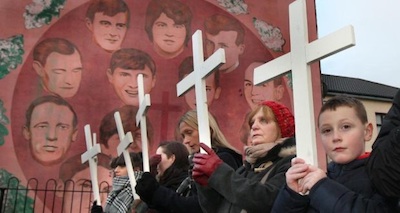
Many of the issues behind the original Bloody Sunday march are still relevant today, marchers attending a Bloody Sunday commemoration rally have been told.
Several thousand people attended the march and rally which was organised in Derry by a number of the Bloody Sunday families.
Last weekend’s march traced the route of the original anti-internment demonstration. However, rather than gathering at Free Derry Wall for a rally, the marchers held this year’s protest meeting at the city’s Guildhall.
Liam Wray, whose brother Jim was one of those shot dead, urged people to give evidence to the PSNI investigation into Bloody Sunday.
Mr Wray said people must keep pressure on politicians and police to ensure that the crimes of the troubles were investigated properly.
“They [the PSNI] are not doing their job willingly. They are very reluctant but we must keep keeping them to their task,” Mr Wray said.
A huge screen was used to display a re-run of British prime minister David Cameron’s 2010 apology for Bloody Sunday. An actor was used to “update” the statement in line with the campaign’s demands that those involved in the massacre be held accountable for their actions.
Keynote speaker, Dublin independent socialist TD Clare Daly said many of the issues for which people marched on the original Bloody Sunday were still relevant.
“It’s a cruel irony to think that many decades ago people marched on these streets against internment and yet now we have dozens of people languishing in prison interned without trial; awaiting trial, languishing in prison, an absolute disgrace.
“We’ve had hunger strikes and dirty protests to secure decent prisoner conditions and yet since last Thursday men in Maghaberry have been on a lockdown,” she said.
Ms Daly accused the prison authorities of failing to implement an agreement reached with prisoners over conditions.
“We’re here to say that that’s just not good enough; that north and south people will not endure a world where human rights and civil rights are not respected,” she said.
The march came at the end of a difficult week for the families, after serious divisions emerged over plans for a new stained glass window at the Guildhall. A number of families oppose plans to include a depiction of the scenes which greeted the 2010 Saville report. However, some families and local politicians have backed the design, suggesting the emphasis in commemorations should be on the “validation” of the families in 2010 rather than the continuing campaign for justice.
The previous day, Friday, January 30th, a broad group of relatives met at the city’s Bloody Sunday monument to remember the moment when British Paratroopers entered the Bogside 43 years before.
Joe McKinney, whose brother William was one of those shot dead, told the gathering that two of the families’ three aims - the repudiation of the 1972 Widgery report and the exoneration of the victims - had been achieved with the 2010 Saville report.
The third aim was the prosecution of the soldiers responsible.
The Derry man called on everyone who took part in the original march to cooperate with a re-opened PSNI investigation into Bloody Sunday, adding that the new inquiry should focus on the British army and its chain of command. “Whoever needs to be questioned, whoever needs to be arrested, it is time to do it,” Mr McKinney said.
HONOURED?
Meanwhile, the family of a man shot dead by British soldiers on Bloody Sunday called for two of the officers in charge of the unit that killed him to be stripped of their honours.
Derry woman Kate Nash said an OBE given to Colonel Derek Wilford and a knight-hood handed out to General Sir Mike Jackson should now be forfeited.
Her lawyers have written to Britain’s ‘Honours Forfeiture Committee’ in London demanding they be stripped of their titles. Her brother, nineteen-year-old William Nash, was one of 14 civilians shot by the Parachute Regiment in January 1972.
![[Irish Republican News]](https://republican-news.org/graphics/title_gifs/rn.gif)
![[Irish Republican News]](https://republican-news.org/graphics/title_gifs/harp.gif)

